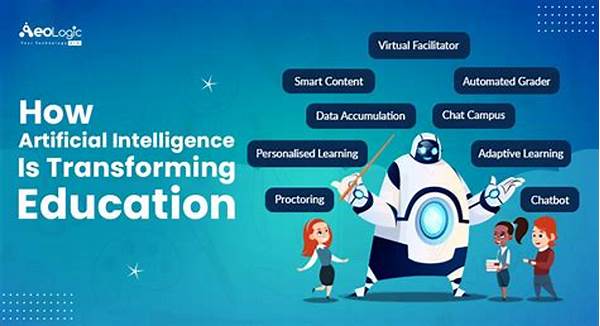Transforming Education with Artificial Intelligence
In the fast-paced world of technology, the transformative power of artificial intelligence (AI) is reshaping industries across the globe. As we delve deeper into the digital age, one sector stands on the brink of significant and groundbreaking change: education. Transforming education with artificial intelligence is not merely a futuristic ambition; it’s the current wave of innovation that’s redefining how learning is delivered, tailored, and experienced. Imagine a learning environment where each student receives personalized attention, course materials adapt dynamically to the individual learner’s pace, and administrative tasks are streamlined for educators. With AI, this vision is quickly becoming a reality, promising a more inclusive, efficient, and engaging educational paradigm.
The adoption of AI in education serves several critical purposes, promising to enhance both teaching and learning processes. Through intelligent machines, we are beginning to recalibrate traditional pedagogical models, catering not only to advanced students but ensuring those who require extra assistance don’t fall behind. By promoting an adaptive learning infrastructure, AI leverages vast datasets to understand and predict student performance, preferences, and potential obstacles. Beyond the classroom’s four walls, AI facilitates remote learning, expands access to high-quality education globally, and bridges gaps in underserved communities. The potential for transforming education with artificial intelligence is immense, heralding an era where each learner’s journey is optimized for success.
Benefits of AI in Education
Artificial Intelligence is nothing short of a game-changer in education. Traditionally, educators have faced challenges in catering to diverse learning needs within a single classroom. AI, however, opens the door to personalized education, accommodating different learning styles and paces efficiently. Imagine a classroom where no student is left behind; how exhilarating! With AI applications, learning can be tailored, ensuring that knowledge is not only imparted but absorbed and understood.
Beyond personalization, AI is bringing efficiency and ease to educators’ lives. By automating administrative tasks such as grading, AI gives teachers the time and focus to nurture creativity and critical thinking – areas that machines cannot replace. The integration of AI in curricula can even foretell and mitigate dropout rates by identifying at-risk students early through data analysis. This new frontier – transforming education with artificial intelligence – is not just a possibility; it’s well within reach and slowly becoming the educational standard.
Transforming Education with Artificial Intelligence: A Closer Look
When discussing transforming education with artificial intelligence, it’s worth diving deeper into the real-life applications. AI-driven tools can provide instant feedback to students, which allows them to understand and learn from their mistakes immediately – a crucial aspect of effective learning. Additionally, virtual tutors powered by AI offer 24/7 support to students, answering queries and providing assistance beyond school hours, fostering continuous learning.
The global scale of AI’s impact is another facet worth noting. Geographic barriers are becoming obsolete; students from underdeveloped regions now have unprecedented access to world-class educational resources. By aligning high-tech tools with human-centric teaching methodologies, AI is ensuring that education does not linger behind in the march of technological progress but rather leads the charge in forming a knowledgeable, adaptable, and innovative future generation.
Practical Applications of AI in Education
Leveraging AI in education is no longer a distant prospect or a luxury for affluent institutions. Schools and universities worldwide are implementing AI strategies to facilitate a more engaging and effective learning environment. Here are some illustrative examples:
The Future of Learning with AI
The revolution of transforming education with artificial intelligence is undeniably underway. As we forge ahead, it’s imperative to ensure that this technology is used ethically and inclusively. Teachers and policymakers must work collaboratively to design AI systems that uphold educational equity. Moreover, maintaining a critical dialogue around AI’s role in education ensures that its integration complements, rather than replaces, the innate human touch that is essential to teaching. By doing so, we safeguard a future where AI in education empowers both students and educators, paving the way for a brighter, more informed world.
Ethical Considerations in AI-Driven Education
While the horizons seem endless, the journey of transforming education with artificial intelligence comes with its set of challenges and considerations. Ethical deployment of AI in education is crucial to prevent biases in learning algorithms that could reinforce existing societal inequities. Data privacy is also a major concern, calling for stringent regulations to protect students’ educational data ethically and securely. As we witness this transformative journey, a balanced approach, incorporating human oversight, will be key to ensuring that the benefits of AI in education are harnessed responsibly.
Conclusion: A Call to Action
The promise of transforming education with artificial intelligence is not just an opportunity but a mandate for those invested in the future of learning. For educators, institutions, developers, and policymakers, now is the time to engage actively with these emerging technologies to refine, iterate, and optimize how education is delivered and experienced. By embracing AI, we can drive progress in a way that enriches learning, making it accessible, personalized, and impactful. Together, let’s harness the power of artificial intelligence to shape education that is not only smarter but more equitable and inclusive. Join the revolution and be a part of transforming education with artificial intelligence today!
Illustrations of AI in Education
As AI continues to make significant strides in reshaping education, staying informed and engaged is integral. By embracing this technology, we unlock unprecedented pathways to knowledge, breaking new grounds in ensuring every student has access to a tailored, equitable, and enriching educational experience.

